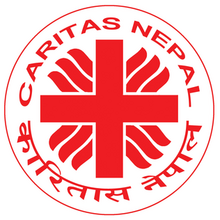Caritas Nepal
कारितास नेपाल | |
 | |
| Established | 1990 |
|---|---|
| Founder | Anthony Francis Sharma[1] |
| Type | Nonprofit |
| Registration no. | 85/047/48[2] |
| Purpose | social welfare, social justice |
| Headquarters | Dhobighat, Lalitpur, Nepal |
| Coordinates | 27°40′22″N 85°18′25″E / 27.6727°N 85.3069°E |
| Origins | Catholic Social Teaching[3] |
| Services | humanitarian aid, development aid, climate change adaptation, peacebuilding |
Official language | Nepali, English |
Patron | Bishop Paul Simick |
| Affiliations | Caritas Internationalis, Caritas Asia[2] |
| Revenue | 350,680,211[4] (2023/2024) |
| Expenses | 327,484,739[4] (2023/2024) |
| Staff | 154[4] (2024) |
| Website | www |
Caritas Nepal (Nepali: कारितास नेपाल) is a Nepalese humanitarian relief and charitable organisation. It is the social arm of the Catholic Church in Nepal and a member of both Caritas Internationalis and Caritas Asia.[5]
History and work
[edit]Caritas Nepal was founded in 1990 by Anthony Francis Sharma to support the most vulnerable members of society, particularly in response to natural disasters or other emergency situations.[1][6] In 1991, the organisation opened its first school for Bhutanese refugee children. Four years later, Caritas Nepal provided help to families from 17 villages of Bardiya affected by floods.[4]
In 2003, the organisation started its integrated pest management (IPM) approach and became one of a several organisations that played an instrumental role in the dissemination of IPM technologies in the country.[7] Another major pillar of Caritas Nepal's work is its climate change adaptation projects.
In 2015, Nepal was struck by a devastating earthquake. Caritas Nepal redirected much of its ongoing work to life-saving activities and quickly became a major relief and rehabilitation actor. Its initial efforts included the provision of immediate relief materials to earthquake-affected individuals, such as clothes, sleeping mats, blankets and WASH items like buckets and soap, as well as tarpaulin sheets.[8] Later, the organisation supported the reconstruction of thousands of homes for affected families.[9][2]
In 2023, Sr. Durga Cecilia Shrestha, a member of the Sisters of St. Joseph of Cluny, became the first woman to lead Caritas Nepal.[10]
The organisation consists of a head office, three provincial offices, and nine field offices. Caritas Nepal carries out its work through both staff and volunteers.[8] In 2024, the organisation operated in 23 districts, supporting more than 40,000 people.[4]
References
[edit]- ^ a b "Nepal's first bishop Mgr Anthony Francis Sharma passes away". AsiaNews. 12 November 2015. Retrieved 28 December 2024.
- ^ a b c Achievement, Good Practices and Case Studies of Nepal Earthquake Recovery Programme (NERP) (PDF), Caritas Nepal, 2018, retrieved 28 December 2024
- ^ "Caritas Nepal". Community Based Disaster Risk Management Platform. Retrieved 28 December 2024.
- ^ a b c d e "Annual Report 2023-2024". caritasnepal.org. Retrieved 26 December 2024.
- ^ "Caritas Nepal". Caritas Internationalis. Retrieved 26 December 2024.
- ^ "Caritas Nepal". peaceinsight.org. Retrieved 28 December 2024.
- ^ Shrestha, Sukraraj; Prasad Amgain, Lal; Pandey, Prem; Bhandari, Tarjan; Khatiwada, Sudip (2024). "Adoption status of integrated pest management (IPM) practices among vegetable growers of Lamjung district of Nepal". Heliyon. 10 (18). Retrieved 28 December 2024.
- ^ a b "Nepal: A year after the earth shook". Trócaire. 25 April 2016. Retrieved 28 December 2024.
- ^ Caritas Rebuilding Efforts: Two Years On | "Mobilising communities towards a steady recovery" (PDF), Caritas Nepal, 2017, retrieved 28 December 2024
- ^ Pragati Shahi (15 December 2023). "Nepali sister becomes first woman to head Caritas Nepal". Global Sisters Report. Retrieved 26 December 2024.
